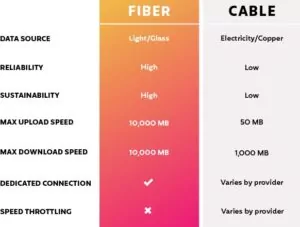With fiber-optic internet becoming available in households across the United States, more consumers than ever have the choice between fiber and cable technologies – and the winner is clear. Fiber has superior speeds, is far more reliable, and you get dedicated bandwidth, so your service is not affected by your neighbors’ activity. Fiber-optic internet gives you the best online experience every single time.

Lightning-Fast Speeds
The key difference between fiber-optic internet and cable is the way that they transmit information. Fiber-optic technology uses thin, flexible strands of glass to transmit data through pulses of light. The strands are bundled together and protected by layers of plastic, which makes fiber faster, clearer, and capable of traveling longer distances compared to coaxial cables. This allows you to stream high-definition videos, download large files, and enjoy online gaming without any buffering or lag.
Enhanced Reliability
Where fiber-optic internet is transmitted using glass and light, traditional coaxial cable technology uses copper and electricity. Unlike fiber, cable’s reliance on electrical signals causes it to be more susceptible to interference from harsh weather conditions like extreme heat/cold, hurricanes, and electrical storms. Copper and aluminum also rust and erode over time, which means more maintenance and less reliability. With fiber, you can count on a stable internet connection, even during peak usage times or inclement weather.
Future-Proof Technology
Fiber optic internet is considered future-proof because it’s bandwidth far exceeds what society needs to function – even far into the future. A single strand of fiber can handle an entire household’s internet connection without sacrificing speed, no matter how many devices are connected to the internet at once. With fiber-optic internet, you are ensuring that your internet connection will meet the demands of tomorrow’s technology.
No Bandwidth Sharing
Cable internet typically has download speeds between 10 mbps and 200+mbps, with upload speeds even slower. During peak usage times, these speeds may decrease even further due to bandwidth sharing. Multiple homes in your area could be connected to the same cable line which means that the connection is divided among users. On the other hand, fiber-optic internet offers an individual, dedicated connection to your home with symmetrical upload and download speeds far faster than cable.
Exceptional Customer Service
At IQ Fiber, we have a local customer service team that is based in Jacksonville. Unlike cable companies that often leave you waiting on hold for 45+ minutes or force you to navigate through endless automated menus, we pride ourselves on our exceptional and efficient customer service. When you choose IQ Fiber, you can expect to speak to a real person without the long wait. Our dedicated team is here to answer your questions, address any concerns, and provide the support you need to ensure a seamless internet experience. We also maintain an active presence on social media, consistently and quickly responding to messages.
Experience IQ Fiber, A Smarter Internet Choice
When it comes to internet connectivity, IQ Fiber stands head and shoulders above the competition. Our fiber-optic internet service offers lightning-fast speeds, unmatched reliability, and a customer service experience that puts you first every time. With IQ Fiber, you’ll never have to settle for subpar internet, hidden fees and contracts, or automated customer service bots again. Check to see if your home is in an available Fiberhood and experience a better connection with IQ Fiber.